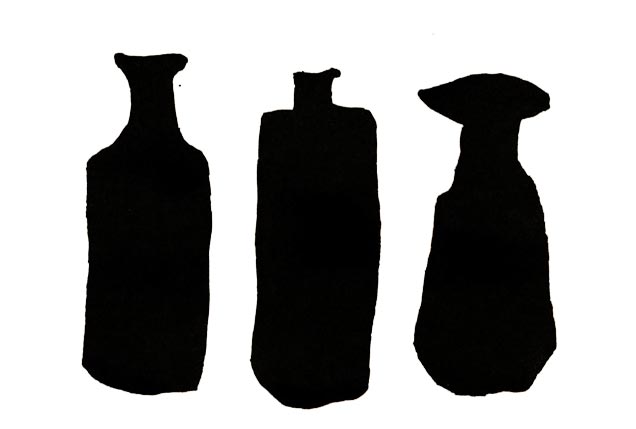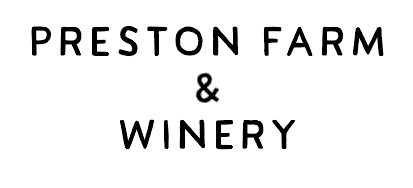Vineyards & Winery
Dry Creek Valley has a long and rich history of grape growing and wine production that reaches back to the late 1800s, when local immigrant families settled here to forge new lives and develop new communities. This vibrant stretch of Sonoma County has a deep, personal and survivalist side, reflected in the hard-scrabble quest of farmers to eke out a living from the soil, inventive adaptation to the rigors of Prohibition, and the contemporary blend of winemakers who blaze new trails in our growing valley. All of this culminates in the prideful joy of sharing with friends and neighbors the hand-wrought fruit of one’s labors. Our winery takes a page from all of these chapters as we balance tradition and innovation, allowing the unique personality of our land to shine through in our estate-grown wines.

Farming
The methods employed at Preston are an amalgam of the teachings of UC Davis and practices followed historically by local farmers: academic vs tradition. An overarching dictate in both cases is to honor the specifics of the soils and local climate in the selection of grape varietals. Vine culture also is a dance between University dictates and neighbors’ habits. In general, we have come to appreciate the old ways because they are less intrusive to natural growing patterns and more compliant with Organic practices. Cover crops and compost replace chemical fertilizers, mechanical cultivation replaces herbicide weed control, respect for the health of the soils and greater tolerance for weeds sometimes replaces both. Old-timers here eschewed trellising because it conflicted with draft-horse cultivation; we do it both ways depending on the needs of the grapes. Environmental diversity and avoiding monoculture ensures the health of the farm, with natural pest control based on interplanting of different crops, mixed orchard and vine culture, establishment of extensive hedgerows, and protection of wild areas adjacent to vineyard blocks. Healthy farming is a community.
Varietals
Our land in upper-Dry Creek Valley is hot, the soils are well-drained–even gravelly–which led us to choose a medley of grapes whose provenance is Southern Europe. Our original property purchase included 100-year old blocks of Zinfandel and Carignane. To that we added grapes typical of France’s Rhone Valley and Italy’s Piedmont region bringing the varietal count to 13. An outlier in the mix was Sauvignon Blanc, a grape more at home to European coastal areas or northern river systems, but one that contradicted its cool-weather heritage by excelling on our farm.
The early selection of wine grapes was also based on what was already proven to do well here, and that was largely driven by the history of this neighborhood. We adopted the lore of the Prohibition period emphasizing robust red grapes that supplied shipments to home winemakers around the country and to illicit bootleggers here at home. Again it pointed to Zinfandel and Carignane plus the darkly pigmented Petite Sirah. Exploration of exotic grapes began with a fortuitous agreement with neighboring Dry Creek Vineyards to grow Sauvignon Blanc on contract. A lasting new direction came with the first trial block of Syrah, whose successful vinification was followed in short order by the planting of Mourvèdre, Cinsault, Grenache, Viognier, Marsanne, Rousanne, and Grenache Blanc.
Winemaking
Our winemaking philosophy and strategy is based on minimal intervention, relying on the health and balanced growth of the vines to guide the process. Grapes are gently harvested by hand, fermentations proceed naturally without the addition of commercial yeasts or bacterial inoculation, the addition of sulfites is minimal.
As all of our wines are made from grapes that we grow here on the farm, we have developed a deep understanding of the potential of each varietal and vineyard block. This enables us to utilize both blending and single varietal production as creative tools to ensure the optimum expression of each wine. And we have long been influenced by blending traditions of Rhone Valley producers in the marrying of Syrah, Mourvèdre, Grenache, Carignan and Cinsaut within our L.Preston Red, and Roussanne, Viognier, Marsanne and Grenache Blanc into our Madam Preston white.
We strive for balanced wines with emphasis on nuance rather than power. Alcohol levels, tannin presence, oak finish: all are moderate and balanced. Our goal is that the wines reveal their innate quality without an overlay of intrusive winemaking technique.
Terroir
Our goal is that our wines retain an authenticity that reflects where and how we grow them. The standard variables of terroir are soils and climate and how those interact with the different grape varietals. As we eased ourselves into the Organic world we came to appreciate the nuances of the microbiological world we work in as well. Soil microbial life has a lot to do with the flavor and health of the things we grow, and by our minimalist approach to farming we protect those organisms and ensure their impact. The same applies in the wine cellar. The less we do to the grapes on their journey to becoming wine, the more true to its inherent nature will be the wine. So we add no commercial yeast and no bacterial inoculums to drive the fermentations. It all happens naturally with organisms that are present in our vineyard and cellar. We think of our wines as an expression of our community of living things: soil organisms feeding the vines, grapes gathering the energy of their environment, wild yeasts and bacteria orchestrating a distinctive and unique symphony of flavor. That’s our take on terroir.
Community
Our winemaking aspirations began as an artisanal grapes-into-wine project, a singular and solitary endeavor in the lonely prune dehydrator we had converted to a crude winery. One day 40 years ago there was an insistent knock on the door; It was the owner of Red Arrow Liquor, an aspiring new wine shop in Chicago, who had heard about a young upstart making Zinfandel in Dry Creek Valley. But he didn’t just want to taste our wine, he wanted to hear our stories so he could feel like he was part of them. That was more than our first serious customer, it was our beginning awareness of the importance of the history, tradition, and culture of wine. Over the years we’ve experienced the joy of making wines we love and having customers that love them too. A heartfelt aspect of our broad community has been the lore of Dry Creek Valley, the shared ghosts of our predecessors on this land, the poignant calm of a summer afternoon sipping wine in the shade of the walnut tree, and thoughts of a farm-grown dinner washed down with a tumbler of wine. Our customers have become our friends and now we are introduced to the adult children of our early visitors who keep coming back. Ours is a shared community of wine lovers, story tellers, family memories and treasured moments. A community of wine.


